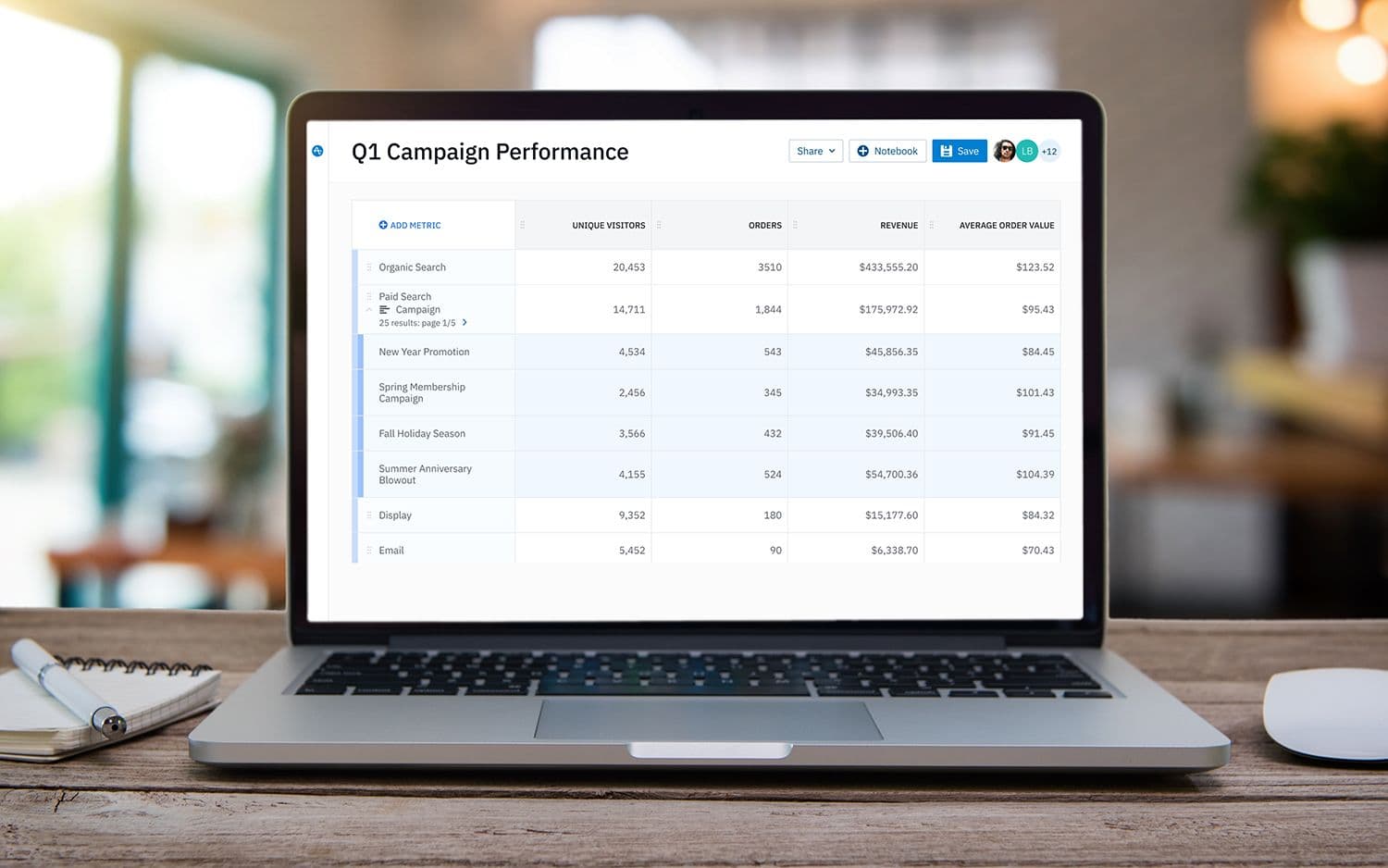Marketing Analytics Tools: What They Are and Why They Are Important
Learn what marketing analytics tools are and why they are important to the success of an organization.
Marketing analytics tools help marketers track campaign performance, align on business goals, predict future marketing trends, and monitor return on investment (ROI). Marketing analytics tools are vital to helping business stakeholders answer important questions about their marketing efforts.
Marketing analytics has become such a crucial business component that 54% of companies that use it end up with higher profits than average. According to the 2020 CMO Survey, companies with over $10 billion in sales revenue said marketing analytics contributed to their revenue growth.
Key takeaways
- Marketing analytics tools are important to the success of a business. They help marketers track marketing activities, understand their audience, and communicate ROI to stakeholders.
- Marketing analytics tools help you:
- Analyze user behavior to personalize your marketing activities.
- Track and gather insights from all channels in your marketing mix.
- There are different types of marketing analytics software, including:
- Web analytics tools
- Social media analytics tools
- Email marketing analytics tools
What are marketing analytics tools?
Marketing analytics tools are software solutions used by businesses to track their marketing activities, understand their audience better, and analyze the results of their marketing efforts. They give companies insights surrounding essential metrics like customer lifetime value (CTV) and cost per lead (CPL).
The best marketing analytics software have proven time and time again to be an essential asset to the success of implementing a business’ marketing strategy. The tools help marketers optimize their efforts to reach the right audience at the right time, create the most compelling, successful marketing campaigns possible, and measure the impact of their marketing activities.
Why are marketing analytics tools important?
Marketing analytics tools are essential for several reasons, but these two are core to a marketer’s job:
- Creating the perfect campaign.
- Successfully tracking campaign performance and results across all marketing channels.
It’s important to solve for both optimal campaign creation and accurate marketing attribution.
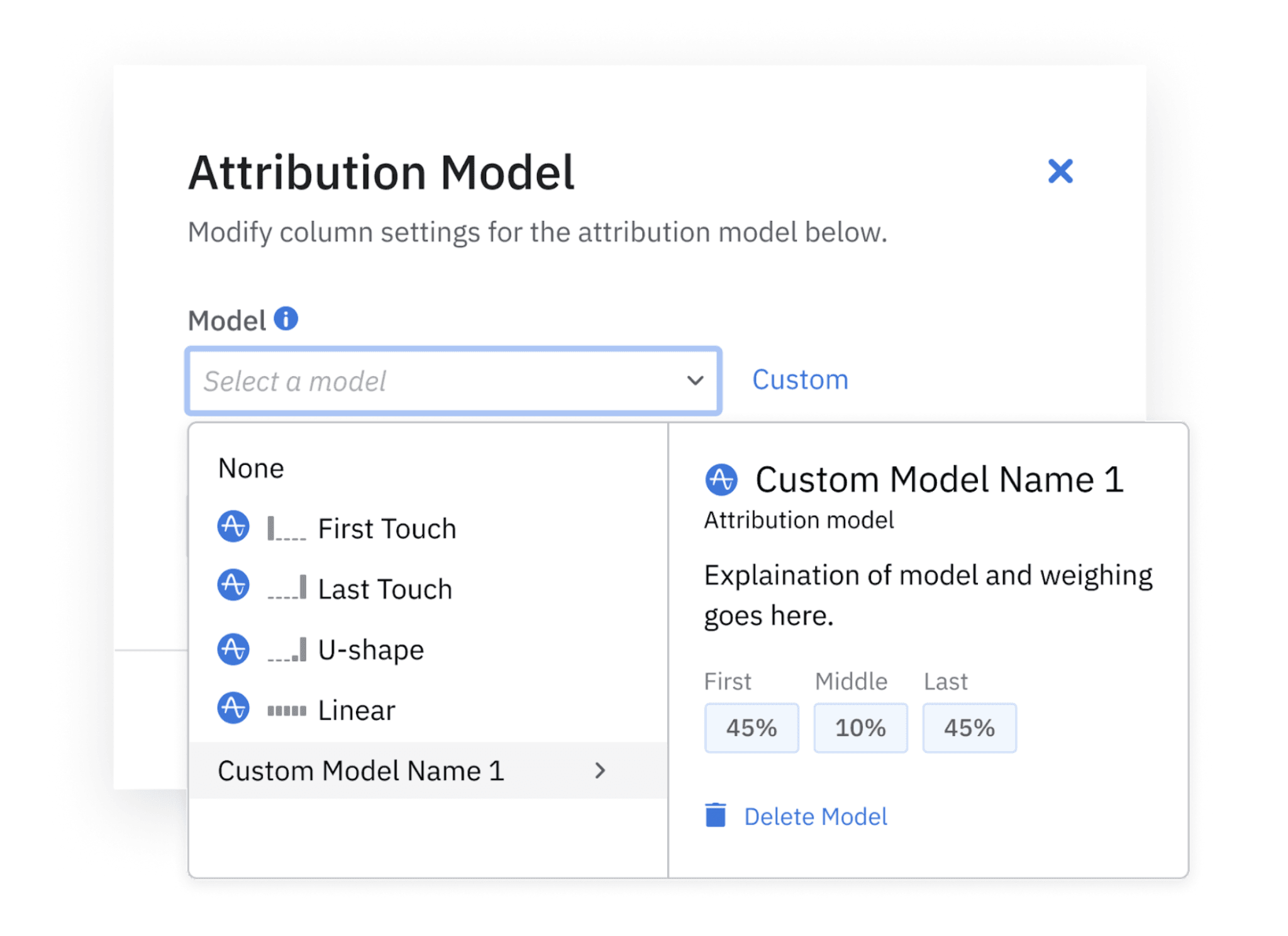
Use Amplitude to easily distribute credit for your marketing programs using an attribution model.
They help you tailor your campaigns to your audience.
Analyzing user behavior with marketing analytics tools can help marketers predict how likely customers are to respond to specific offers based on their behavior within defined segments or cohorts. For example, a marketer puts out two ads for the same offer but with different headlines and calls to action; with a digital marketing analytics tool, the marketer can track the ad with the most responsive audience, the behaviors of people that responded, the platforms the audience is responding from, etc.
With this information, marketers can accurately personalize the content of future campaigns using a tool like Amplitude Recommend to match customer preferences and deliver campaigns when and where they want them.
Without digital marketing analytics tools, businesses will keep spending a lot of money on ads to get minimal results. For example, a company might spend $1,500 each on Facebook and LinkedIn ads ($3,000 total) targeting 10,000 people and get 100 leads—$30/lead. With marketing analytics software, the company can quickly analyze the data of the past 100 leads. If, for example, 80 of those 100 leads were from LinkedIn, the company can focus its next set of ads on LinkedIn and see a lower cost per lead.
They track and analyze marketing activities across multiple channels.
Marketers reach out to customers on multiple channels—both online, via social media ads and search, and offline, via print and television. But it’s challenging to know which customers respond to which channels, particularly the offline ones. Similarly, it’s difficult to tell if and when a customer responds to both an online and offline channel.
Marketers must work with multiple online and offline channels to reach potential customers. Having these various data sources has made it challenging to have a 360-degree view of customers because of the difficulty in integrating all of that data.
A marketing analytics tool unifies customer data and can tell you when a particular customer responds to any channel. Marketing analytics software can gather data from all channels in your marketing mix—from social media platforms to email marketing tools or your website—and report on them simultaneously. You can quickly generate reports on each channel and share them with stakeholders. By having a unified view, marketers can identify the strongest and weakest marketing channels and use that information to manage their marketing budget and resources accurately.
Who uses marketing analytics tools?
The following groups use marketing analytics tools to set up or consume reports:
- Marketing managers
- Website managers
- SEO specialists
- Product managers
- Business leaders
- Sales representatives
What are the different types of marketing analytics tools?
A business needs several marketing analytics tools depending on its marketing strategy and goals. Marketing analytics tools are broad and fall under a wide range of categories. However, these three are the most common to any organization irrespective of industry, audience, or marketing goals:
- Web analytics tools
- Social media analytics tools
- Email marketing analytics tools
Web analytics tools
Web analytics tools help marketers track, measure, and report website activity, like website traffic, time users spend on the website, where users are coming from, etc. In short, they gather and structure data on your website’s performance. Marketers can use them to track and compare metrics like the difference between the number of new vs. returning website visitors in two different quarters of the year.
Web analytics tools show you which sources your website attracts the most visits from (social media, search, referrals, etc.). They also provide data on the pages where your site visitors spend the most time, how long they stay, and where they exit from. Instead of a manual approach, the entire point of using a web analytics tool is to access all of this data in a couple of clicks and gather insights from one glance at your screen.
If a business is investing in SEO, web analytics tools help track and analyze the results of its SEO activities. For example, if your website visitors enter from a Google search and spend a majority of their time on a particular blog post, it is a sign that they are interested in that subject matter. You can then create more content around the same subject matter and link the posts together so your web visitors can go deeper into the website and learn more. If you were not tracking website activities, you would not know what your audience is most interested in on your website, and you would be leaving money on the table if you can’t provide the value they want.
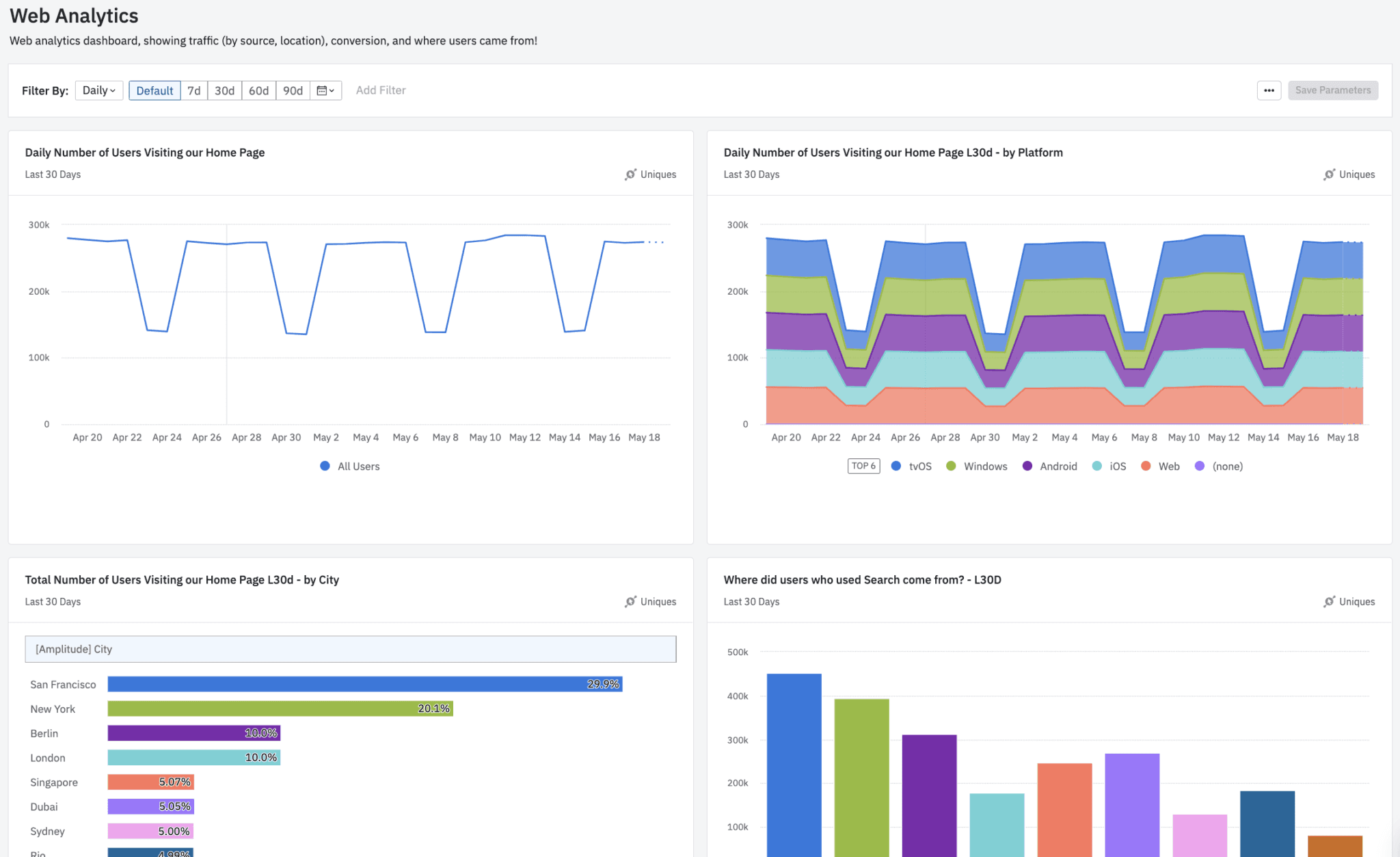
An example web analytics dashboard in Amplitude.
Social media analytics tools
Social media analytics tools help marketers collect data from social media platforms and use that data to fine-tune their social media marketing activities. These tools go beyond the default analysis of “retweets” and “likes” accessible to you on social media platforms and help you track conversations around your product, brand, industry, and even your competition.
You could easily set your tool to alert you every time someone mentions your brand name, for example, in case there is a growth opportunity or a looming disaster that you can turn around. Some tools add an extra layer of sophistication by using artificial intelligence (AI) to detect the emotions behind social conversations and determine whether they are positive or negative.
You can also use social media analytics tools to analyze the competition’s social media efforts, see how consumers react to their marketing activities, and how consumers engage with their products or services. Since you share a target audience with them, you can gain insights on what you should or should not do for your prospects and how you can perform better.
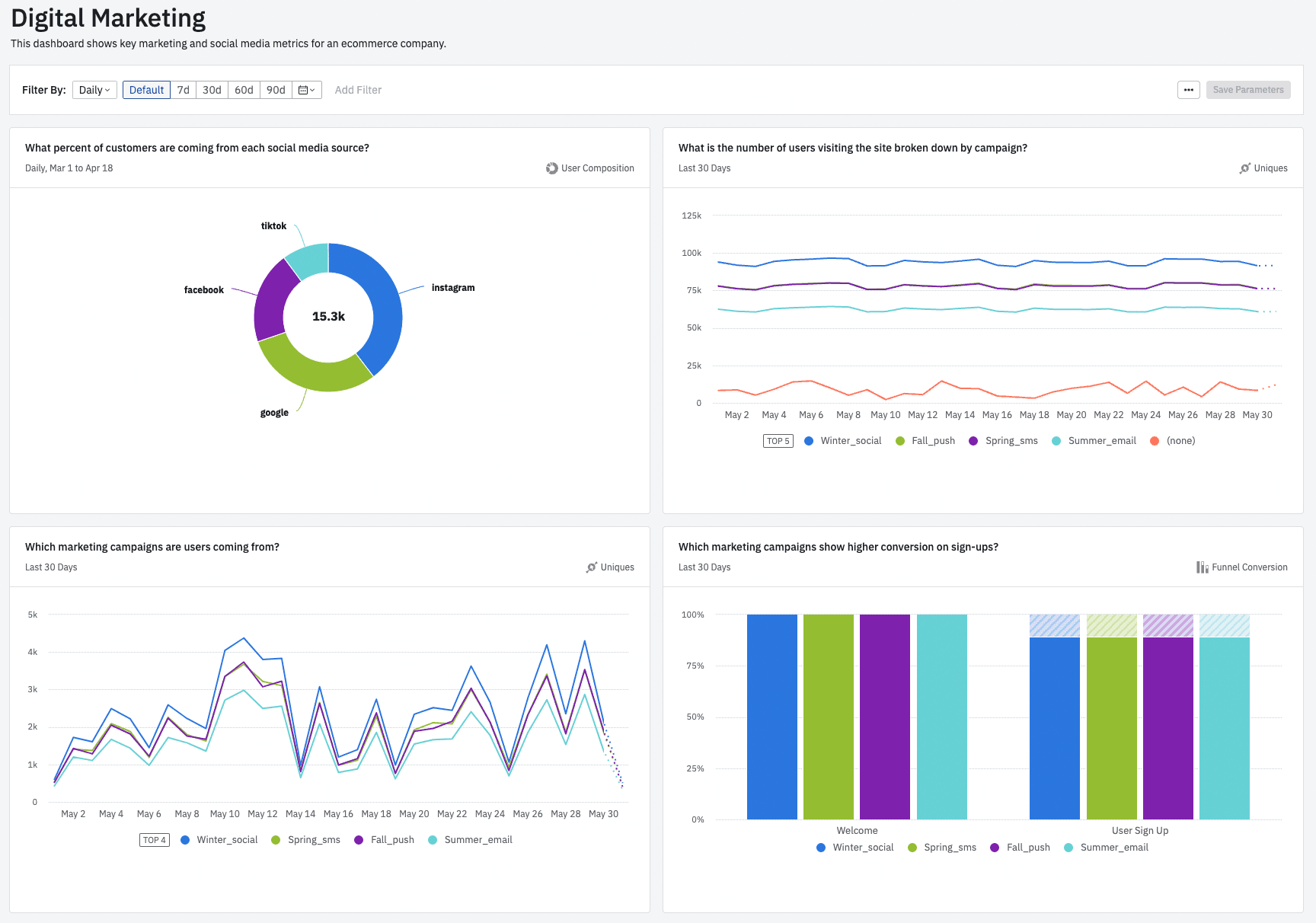
An example marketing and social media analytics dashboard in Amplitude.
Email marketing analytics tools
Email marketing analytics tools help track how your mailing list subscribers interact with your emails. They allow you to track how many people opened it, if they read it to the end, or closed it immediately. Email marketing analytics tools provide data and insights that help guide marketers on how to build and strategize email marketing campaigns for better results. You can track subject lines that get opened more, what type of emails bring people to your website or product, and which emails ultimately drive conversions.
Marketing analytics tools for total visibility
These marketing analytics tools provide total visibility for both your audience and your product.
Amplitude
Amplitude Analytics helps marketers understand campaign performance by tying it to product outcomes like customer retention and lifetime value. Beyond tracking data like page views and clicks, marketers can:
- Identify which campaigns drive higher engagement and conversion.
- Understand the holistic customer journey and accurately report on attribution.
- See which acquisition channels users come from across organic and paid sources.
- Measure the ROI of ad investments across channels such as Google, Facebook, and LinkedIn.
- Use Journeys to view what path users who landed on a marketing landing page or blog post followed.
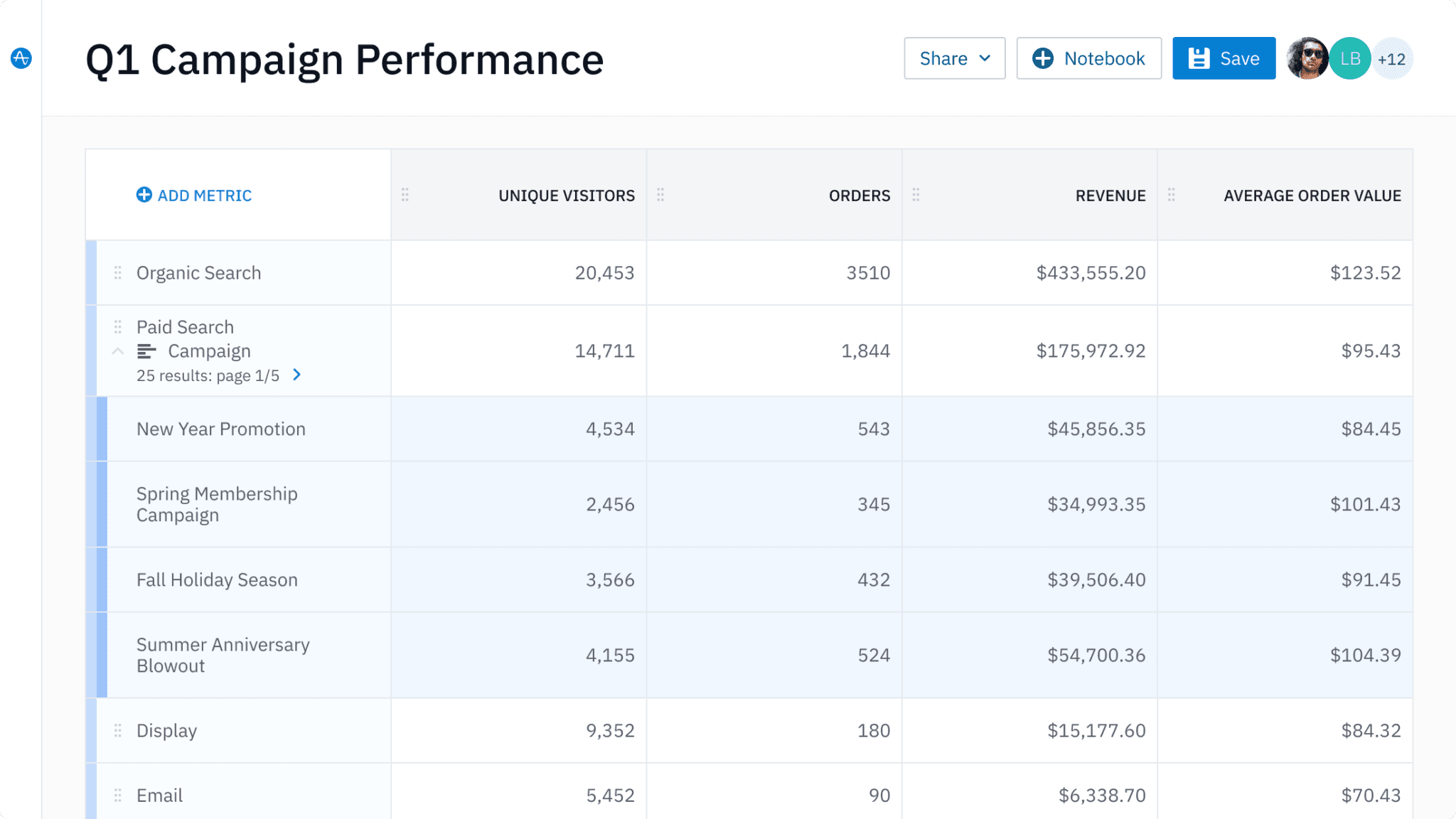
Use Amplitude to see a holistic view of marketing campaign performance.
Learn more about Amplitude’s marketing capabilities, or get started with a free plan today.
References
- How Marketers Use Data Analytics To Reach Customers. Tax and Business Online
- The 2020 CMO Survey. American Marketing Association
- The Best Marketing Analytics Tools. G2
Ready to understand and optimize your marketing campaign performance? Get started with Amplitude’s marketing analytics capabilities for free.

Noorisingh Saini
Global Content Marketing Manager, Amplitude
Noorisingh Saini is a data-driven marketer managing global content marketing at Amplitude. Previously, she managed all customer identity content at Okta. Noorisingh graduated from Yale University with a degree in Cognitive Science.
More from Noorisingh
